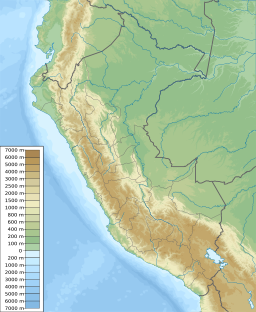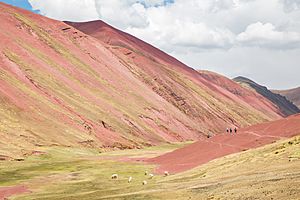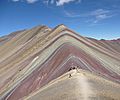Vinicunca facts for kids
Quick facts for kids Vinicunca |
|
|---|---|
| Highest point | |
| Elevation | 5,200 m (17,100 ft) |
| Geography | |
| Location | Peru |
| Parent range | Andes |
Vinicunca, also known as Winikunka, is a stunning mountain in the Andes mountains of Peru. People also call it the Mountain of Seven Colors (Montaña de Siete Colores) or Rainbow Mountain (Montaña Arcoíris). It stands very tall, reaching about 5,200 meters (17,000 feet) above sea level!
This amazing mountain is found on the way to the famous Ausangate mountain. It's located in the Cusco region, between two districts called Cusipata District and Pitumarca District.
Not long ago, around 2010, many tourists started visiting Vinicunca. They were drawn by its incredible stripes of different colors. These colors come from the many types of minerals found in the mountain's rocks. Before, the mountain used to be covered in glaciers, but these have melted because of climate change.
Contents
Where is Rainbow Mountain?
Vinicunca is located southeast of the city of Cusco in Peru. You can reach it from Cusco by taking one of two main routes: through Cusipata or Pitumarca.
One way is to drive for about two hours from Cusco to the town of Pitumarca. From there, you can travel by foot, car, or motorbike along a trail. This path goes through small communities like Ocefina and Japura. Eventually, you reach Pampa Chiri, where a 1.5-kilometer (about 1 mile) walk leads you to the colorful mountain.
Another option is to go through Cusipata. From Cusipata, you can walk about 3 kilometers (nearly 2 miles) along the Chillihuani route. This path is a bridle path, meaning it's also used by horses.
The mountain is very high, around 5,200 meters (over 17,000 feet). Because of this high altitude, it's a good idea to take some time to get used to the thin air before you start your hike to the top.
Why is it so colorful?
The amazing seven colors of Vinicunca are all thanks to the different minerals in its rocks! Imagine a giant painting made by nature. Here’s what gives the mountain its vibrant look:
- Pink comes from red clay, mud, and sand.
- Whitish colors are from quartz, sandstone, and marl, which have a lot of calcium carbonate.
- Red is from claystones (which contain iron) and clays from a period called the Upper Tertiary.
- Green is from rocks called phyllites and clays rich in ferro magnesian minerals.
- Earthy brown is from a type of rock called fanglomerate, which has magnesium from the Quaternary period.
- Mustard yellow comes from sandy rocks rich in sulfur minerals.
Visiting Rainbow Mountain
Many travelers and local people agree that the best time to visit Vinicunca is in August. This is because it's the dry season, which means less rain and clearer skies. The dry weather makes the mountain's colors look even more bright and beautiful!
It's a good idea to avoid visiting right after heavy rain, especially in December, January, and February. Snow can also cover the colors, so try to avoid days when it has recently snowed.
While you are there, keep an eye out for animals! You might see many alpacas and other camel-like animals, especially during certain times of the year.
Protecting the Mountain
For a while, there was a discussion about allowing mining companies to explore for minerals near Vinicunca. This worried many people because the mountain is a very important natural and tourist spot.
However, after many people spoke up and protested, the government took action. In 2018, the President of Peru put a temporary stop to all mining activities in the area. This gave time for the region to be officially protected.
Finally, in 2019, Vinicunca and the surrounding Ausangate area were officially named a Regional Conservation Area. This means the area is now protected by the government, helping to keep its natural beauty safe for everyone to enjoy for many years to come.
Gallery
-
Ausangate as seen from Vinicunca
See also
 In Spanish: Vinicunca para niños
In Spanish: Vinicunca para niños
- Apu (god)
- Ausangate
- Tourism in Peru
 | Kyle Baker |
 | Joseph Yoakum |
 | Laura Wheeler Waring |
 | Henry Ossawa Tanner |









